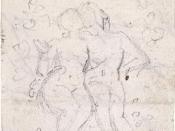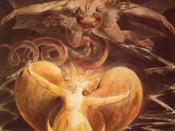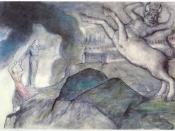A poem that had some depth, in that I couldn't understand and feel what the poem was expressing at first glance. It is a poem that had a sense of mystery around it. These characteristics are exceptionally evident in William Blake's poem "A Poison tree." "Anger," "wrath," and "fear" are very prominent in the short sixteen-line piece and engulf you from the start. In this paper, there will be an argument that "A Poison Tree" is a symbol for the lack of restraint and self-control in man. An argument that Blake, if referring to himself in the poem, uses himself as the serpent from the Garden of Eden, except as a serpent with a conscious. The first stanza juxtaposes the idea of friend and foe in a rather elegant way. The stanza reads, "I was angry with my friend/ I told my wrath, my wrath did end./ I was angry with my foe/ I told it not, my wrath did grow."
The contrast in actions relating to a "friend" in distinction to a "foe," is the relevant theme in this stanza. The different ways in which Blake, if he indeed is referring to himself in this poem, deals with anger towards a "friend" and conversely towards an adversary is striking. When angry with a friend, Blake is able to control his anger and enclose it in a finite sense. On the other hand, Blake shows little forgiveness for an enemy. Blake's harshness and lack of repentance toward the man in this poem cannot be fully realized until looking at the final two stanzas as well as the illustration. The second stanza reads, "And I waterd it in fears,/ Night & morning with my tears:/ And I sunned it with smiles./ And with soft deceitful wiles." This stanza is...



Blake the poison tree
I forgot to mention that this is a well wrbitten essay but it would be a little more accesible if broken into paragraphs
3 out of 4 people found this comment useful.